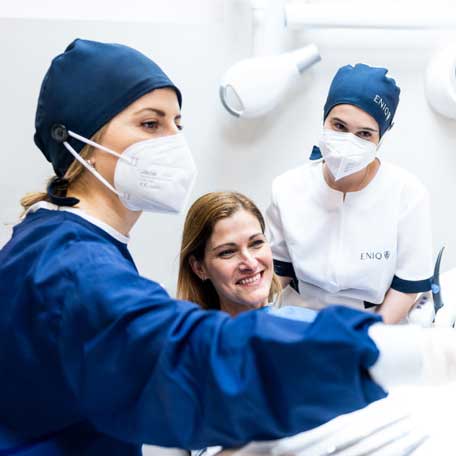

Dental Prosthesis
Discover personalized dental prostheses at ENIQ Madrid.
What is a dental prosthesis?
A dental prosthesis is an artificial device designed to replace one or more missing teeth. These prostheses are essential for restoring chewing function, improving aesthetics and pronunciation, and maintaining the structural integrity of the mouth and face.
What are dental prostheses used for?
Dental prostheses are used to replace lost or damaged teeth. They serve several purposes:
- Functionality: They improve chewing and speech, which can be affected by the lack of teeth.
- Aesthetics: They restore the appearance of the smile, which is important for self-esteem and social interaction.
- Dental Health: They help maintain the correct alignment of the remaining teeth, preventing displacements and other dental problems.
- Structural Support: In some cases, prostheses can provide support to facial muscles, avoiding the sunken appearance that can occur with tooth loss.
In summary, dental prostheses not only improve appearance but also significantly contribute to oral health and functionality.
What are the advantages of placing a dental prosthesis?
Dental prostheses offer several important advantages:
- Improvement in Chewing Function: They allow for more effective chewing, which is essential for good digestion and nutrition.
- Improvement in Diction and Speech: Tooth loss can affect the way of speaking. Prostheses help restore clear pronunciation.
- Aesthetics and Self-confidence: They improve the appearance of the smile and facial aesthetics, which in turn can increase self-esteem and emotional well-being.
- Prevention of Future Dental Problems: By replacing missing teeth, prostheses help prevent adjacent teeth from moving or becoming misaligned, preventing future dental problems.
- Structural Support: They provide support to facial muscles, preventing the sinking of the face that can occur with tooth loss.
- Durability and Efficiency: Modern prostheses are durable and efficient, with materials that mimic the appearance of natural teeth.
- Adaptability and Variety: There are different types of prostheses to suit various needs and situations, from partial to complete, fixed or removable.
- Improvement in Overall Health: By improving chewing and nutrition, prostheses can contribute to better overall health.
Together, these advantages make dental prostheses a valuable solution for those who have lost one or more teeth.
Experts in Dental Prostheses
Advanced Solutions in Dental Prostheses
Innovation
What are the latest innovations in dental prostheses?
Exploring New Frontiers in Dental Prostheses
The evolution of dental technology has led to significant advances in the field of dental prostheses. These innovations not only improve the quality and efficiency of treatments but also offer new possibilities in the customization and precision of prostheses. Below, we explore some of the latest innovations that are setting the pace in this sector.

The Latest in Dental Prostheses:
- 3D Printing: This technology is revolutionizing the dental sector, allowing the production of dental pieces in a variety of materials precisely and quickly. 3D printing in dentistry is growing significantly and is expected to continue its expansion.
- Artificial Intelligence (AI): AI is contributing to the digitalization of the dental sector, improving efficiency and precision in diagnostics, treatments, and follow-ups. Its use in dentistry is increasingly widespread, optimizing dental practices with greater precision and reducing times compared to traditional methods.
These innovations reflect the focus on improving precision, efficiency, and customization in the field of dental prostheses.
Frequently Asked Questions
Do you have more questions about dental prostheses?
With proper care, fixed prostheses can last many years, while removable ones usually require replacement or adjustment every 5 to 8 years.
Yes, modern prostheses are designed to resemble natural teeth, significantly improving the smile and overall facial aesthetics.
Some prostheses are permanent (fixed to the bone or other teeth) and others are removable. Temporary ones are often used during transition periods, such as waiting for a permanent prosthesis.

